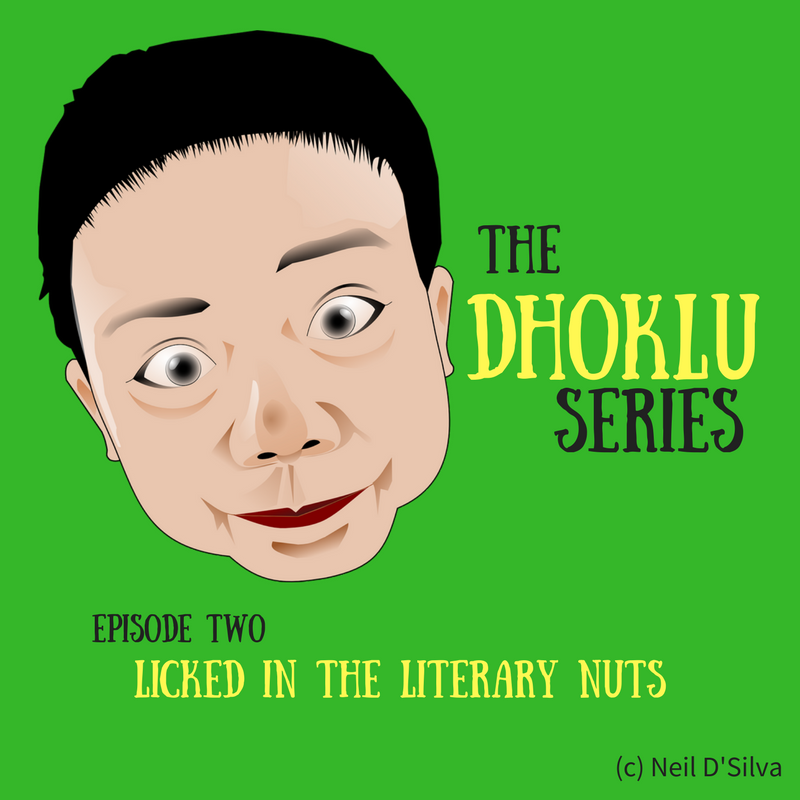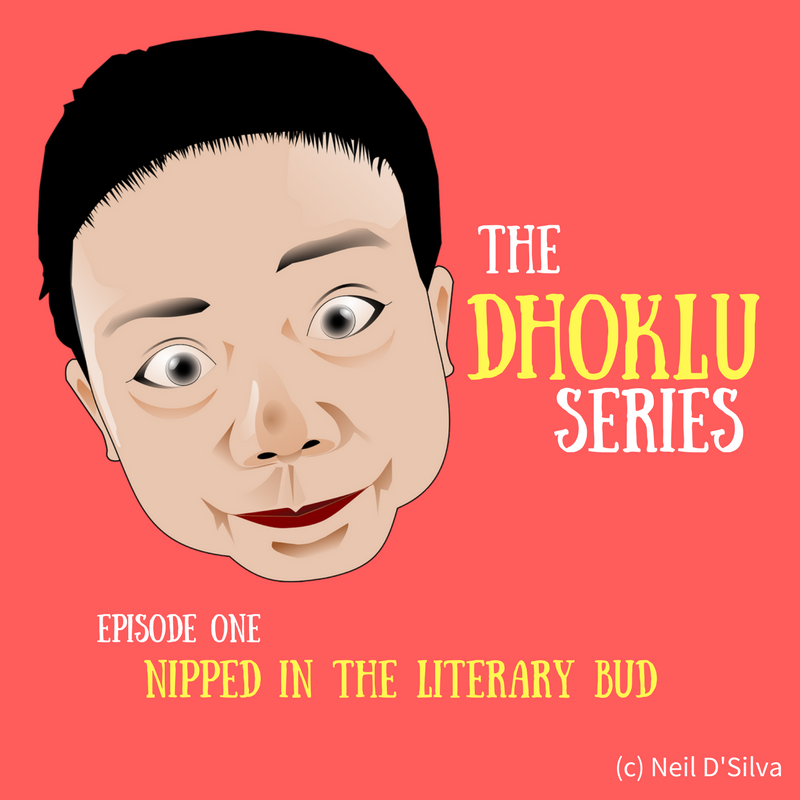RECAP (loosely translated for my Hindi-speaking friends as: Phir se topi pehnana)
(Read Episode One: Nipped in the Literary Bud here.)
In the previous episode, we saw how Dhoklu’s mother kindled (a beautiful word, BTW – Dhoklu is going to learn so much more about the word ‘kindle’ in the near future, and… so many meanings of it!) a spark of literary aspirations in his little mind. We saw how Dhoklu’s teachers and Education Board murdered those very dreams before they started (for references, look at anyone educated in your vicinity, even yourself – 99 in 100 people are doing anything but what their “education” taught them). Then we saw how Dhoklu finally revealed his aspirations to his father who immediately jingled his cash-filled deep kurta pockets and told him to go ahead and make it large.
Let’s see now how large.
Episode 2
Licked in the Literary Nuts
(Written by Neil D’Silva)

After duly searching and researching on what ‘vanity publishing’ means, Dhoklu sat down for a breather. His dad asked him about it, and Dhoklu, like the learned man he was now told him – “Papa, paisa aapvanu chhe ane publish thai jashe!” (“Papa, we have to pay money and I will be published!”)
Papa heard ‘paisa’ and sat down. This was a part he was proficient with. There was a flurry of questions such as ‘ketla paisa’, ‘kone aapva padshe’, ‘returns ketla malshe’ (‘how much money’, ‘whom to pay the money to’, ‘what will be the returns’) and about a dozen more in the same vein, and when it was finally and fully appropriated (through highly optimistic projections) that for every 1 rupee investment there could be a return of 10000 rupees, Ranchhodbhai called up the downstairs Sankalp Pure Ghee Mithai Shop for half-a-kilo kaju katri and another half motichoor laddu.
Dhoklu thanked his lucky stars that his father had not yet asked him about which book he was planning to write. Or about its subject. Or about its characters. Or even the title. So far, Dhoklu was in safe zone. Very safe zone.
The Publisher
Next day, between 10:37 and 10:55 in the morning, Dhoklu was busy on a call. His mother duly shushed the children playing cricket on the street outside, and shouted with as loud a whisper as she could manage, “Dhoklu na Delhi thi call aiwa chhe! Chhup raho!” (“Dhoklu has received a call from Delhi! Keep quiet!”) After making sure that the neighbors had heard her whisper, she shut the window pane.
So, Dhoklu kept the phone down and the next moment, his family gathered around him. Like a man possessed with a dream that’s turning into reality, Dhoklu announced that the call was from Delhi (where else!). Actually, 113 km away from proper Delhi, but who cares for such stuff? It was a vanity publisher, who insisted on being called self publisher. He told everything that Dhoklu needed to do (except the part about writing the book, of course!) There was clear business talk about how Dhoklu would have to buy back 500 copies of his own book once they were published.
Ranchhodbhai interrupted at that point. 500 x 120 = 60000. “Rupya ne? Dollar to nathi?” No. It was not doh-lar as he had pronounced it. Then that was perfect. 60000 was less than what he had spent on feeding his entire family and their families Gujarati thalis from Maharaja Bhog on his eldest daughter’s son’s first birthday. And then treated them en masse to a show of Bajrangi Bhaijaan (most people’s sixth viewing), where the ladies sat together in the front four rows, and the men in all the comfortable back rows. This publishing thing was definitely doable. He patted his grown son’s back like a man possessed.
So, father and son deliberated for a good three hours on which publisher to contact. They went through the websites given to them by Google Baba, and finally father and son zeroed in upon one of them. Ranchhodbhai drove this decision mostly based on the fact that the homepage had the pictures of the right gods and the directors of the company had the right surnames.
The next day, the contract came on email. Dhoklu was very happy on seeing the contract, because it was about ten flimsy points on a green page, that did not even come up to half the page. The title was a blank line for now, which suited Dhoklu all the more! And the language was something Dhoklu could understand very well. It was definitely not the complex and show-offy kind he had read in The Adventures of Tom Sawyer when in school. This was so simple to grasp – “Auther does not lays claims to His books fr nxt 10 Yrs.”
Ranchhodbhai whooped with joy again. “Royalty!” he jumped. “Royalty lakha chhe! Dhoklu, tu to Raja bani gaya re!” (“Royalty is written! Dhoklu, you have become a king!”)
The next day, the entire extended family went to the post office to courier the contract, speed post no less. Firecrackers were burst on the road, and children danced on the Gujarati dubs of Bahubali songs. The womenfolk stood suitably 60 meters away from the menfolk, and everyone gossiped about how Dhoklu was embarking on something that no one had done before.
Dhoklu thanked his lucky stars no one had yet asked him his book’s title.
Dhoklu’s Friends
Now that the news was out that Dhoklu was writing the next bestseller (a word that had gained a lot of currency in that village overnight), the friends – all boys, of course – started pouring in one by one. Dhoklu’s mother had almost permanently positioned herself at the door so that the friends could suitably touch her feet before moving inside.
Every friend came armed with suitable praise – one comment each, and one for backup in case someone else used that one before them. This was quite a difficult task though, because Dhoklu had never been a popular student, and people did not know what to really say to him or about him. So, by the end of the samosa-and-Fanta filled day, Dhoklu was left with comments like, “Dhoklu is so observant! Now I know why he used to keep staring at the girls’ section in the class all the time,” and “Dhoklu has always been a man of words and not of action – remember the time you said you’d come with me to talk to Bhavani Mam and never showed up?”
Meanwhile, Ranchhodbhai had positioned himself by the window with the phone. The 31.30 minute call was to Taarakbhai, and there was definitely a purpose. The purpose was in the form of Ankita, Taarakbhai’s daughter who probably was of marriageable age now. Or maybe a little less, who cares? Hopefully she had returned from wherever in London she had gone for whatever studies she wanted to do.
Studies! Bah! These girls of today…
Come back tomorrow when we continue Dhoklu’s saga. Read about Dhoklu’s new Apple computer and broadband Internet connection on which he discovers the greatest resource for writers there can ever be – Facebook.









